冀教版英语九年级全册知识点
2024年中考英语课件(冀教版)九年级(全册) Units 5-6

1.What do you DD A.think out B.think about C.think over D.think of
Amazing China(《美丽中国》)?
2.—BB the fashion show? —It's great. A.How do you think of B.How do you like C.What do you like D.What do you think
考点 5 among与between辨析(Unit 6 P88)
考点 among
含义及用法
意为“在……中间”,强 调在三者或三者以上的
人或事物之中
between
意为“在……之间”,常 构成短语
“between…and…\”,意 为“在……和……之间”
图片 between
【注意】指三者或三者以上的人或事物中的每两者之间时,仍用between, 不用among。如: The village lies between three hills.村子坐落在三座小山之间。 【温馨提示】由among确定比较范围的句子用最高级。
suggest+that从句 建议……
【注意】表示“一则建议”,用a piece of advice或a suggestion。
1.(2023·连云港改编)Simon always stays up late.Doctor Ma advises him totoapay y(pay) attention to his health. 2.(2022·日照)My friend gave me some adavdiviccee(advise) on how to keep a pet.
1.—(2023·滨州改编)I'm thirsty.I'd like a glass of orange juice.What about you, Betty? —I BB a cup of tea with nothing in it. A.dislike B.prefer C.advise D.hate
冀教版九年级英语下册各单元知识点汇总
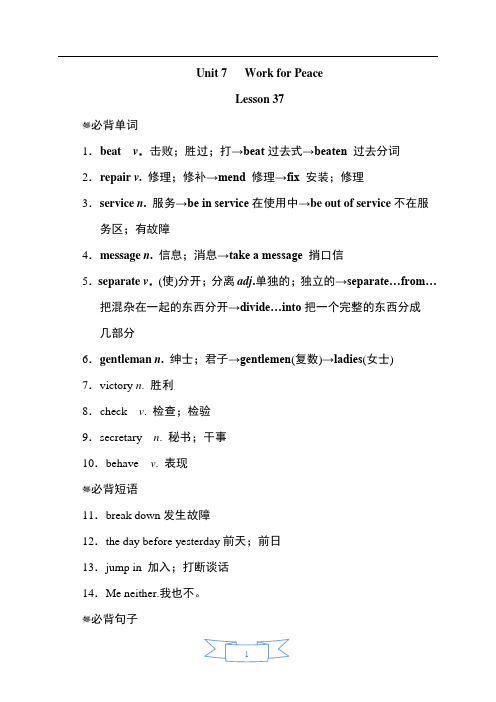
Unit 7 Work for PeaceLesson 37必背单词1.beat v.击败;胜过;打→beat过去式→beaten 过去分词2.repair v. 修理;修补→mend 修理→fix 安装;修理3.service n. 服务→be in service在使用中→be out of service不在服务区;有故障4.message n. 信息;消息→take a message 捎口信5.separate v.(使)分开;分离adj.单独的;独立的→separate…from…把混杂在一起的东西分开→divide…into把一个完整的东西分成几部分6.gentleman n. 绅士;君子→gentlemen(复数)→ladies(女士) 7.victory n. 胜利8.check v. 检查;检验9.secretary n. 秘书;干事10.behave v. 表现必背短语11.break down发生故障12.the day before yesterday前天;前日13.jump in 加入;打断谈话14.Me neither.我也不。
必背句子15.It's fun to win,but I just love to play.赢很高兴,但是我仅仅是喜欢打篮球。
16.Danny is just about to say something when he sees Steven running towards them carrying a basketball.丹尼正要说话,这时他看见斯蒂芬拿着篮球朝他们跑过来。
17.Why didn't you tell me the game time was changed?你为什么不告诉我比赛时间变了?Lesson 38必背单词1.provide v. 提供;供给→provide sb.with sth.给某人提供某物→p rovide sth.for sb.为某人提供某物2.agreement n. 协议;同意→in agreement with同意,与……一致→reach (an) agreement达成一致3.president n. 会长;总统;国家主席;董事长4.organization n.组织;机构5.religion n.宗教6.dispute n. & v.争论;辩论必背短语7.make a difference 有影响;起(重要)作用8.raise money筹钱;集资9.in the end最后,终于10.not always不总是必背句子11.It's not always easy for us to reach an agreement.达成一致对我们来说并不总是很容易。
Unit+1+情态动词need和should+++单元语法讲义-冀教版英语九年级全册
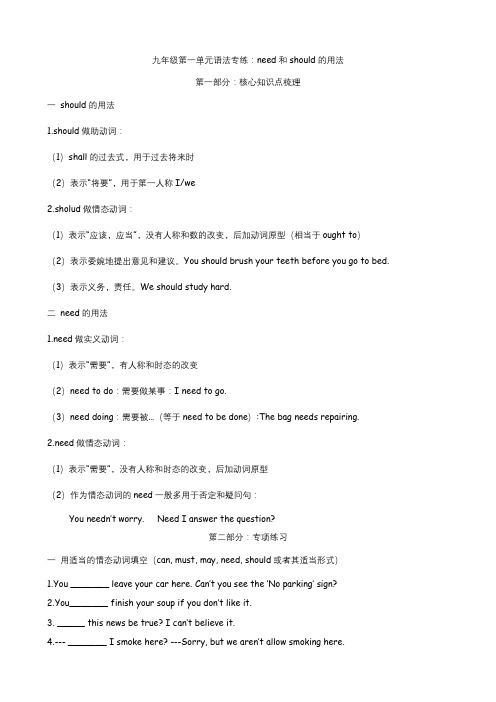
九年级第一单元语法专练:need和should的用法第一部分:核心知识点梳理一should的用法1.should做助动词:(1)shall的过去式,用于过去将来时(2)表示“将要”,用于第一人称I/we2.sholud做情态动词:(1)表示“应该,应当”,没有人称和数的改变,后加动词原型(相当于ought to)(2)表示委婉地提出意见和建议。
You should brush your teeth before you go to bed. (3)表示义务,责任。
We should study hard.二need的用法1.need做实义动词:(1)表示“需要”,有人称和时态的改变(2)need to do:需要做某事:I need to go.(3)need doing:需要被…(等于need to be done):The bag needs repairing.2.need做情态动词:(1)表示“需要”,没有人称和时态的改变,后加动词原型(2)作为情态动词的need一般多用于否定和疑问句:You needn’t worry. Need I answer the question?第二部分:专项练习一用适当的情态动词填空(can, must, may, need, should或者其适当形式)1.You _______ leave your car here. Can’t you see the ‘No parking’ sign?2.You_______ finish your soup if you don’t like it.3. _____ this news be true? I can’t believe it.4.--- _______ I smoke here? ---Sorry, but we aren’t allow smoking here.5.He_______ be the actor, I have seen him on TV.6.I think today’s children_______ learn to respect their elders.7.She_______ swim, but I can’t.8.She said she_______ retire, but she was not sure.9. The clothes _______ washing, they look so dirty.10.You _______ push, there is a lot of room on the bus.二选择( ) 1.We_______build our country into a country of peace and wealth.A mightB shouldC could( ) 2.Dogs _______ run through soccer games at the park. It’s dangerous.A shouldB shouldn’tC needD needn’t( ) 3.To keep children safe, we_______ put the things like knives medicine away in our house.A mayB shouldC canD might( ) 4.Now most young people like shopping online because they_______ spend a lot of time going from shop to shop.A needn’tB can’tC mustn’tD shouldn’t( ) 5.In order to speak English better, we_______ be afraid of failure.A shouldB shouldn’tC have toD could( ) 6.Let’s take a bus, little children _______ tickets.A needn’t buyB needn’t to buyC don’t need buyD needn’t buying( ) 7. —It nearly took me an hour to walk here.—Have a drink, then. You_______be thirsty.A. mustB. shouldC. can( ) 8.—Do you have any plans about this summer vacation?—I_______go to Australia for vacation, but I haven’t decided yet.A. can’tB. mustC. may( ) 9.Please don’t make so much noise. I _______hear what the speaker is saying.A. needn’tB. mustn’tC. can’t( ) 10.—Excuse me, is this the way to the cinema?—Sorry, I’m not sure. But it _______be.A. mustn’tB. mightC. can’t( ) 11.—Mom, must I stay there the whole day?—No, you _______.You _______come back after lunch, if you like.A. mustn’t; canB. needn’t; mustC. needn’t; may( ) 12.—Is that Lucy’s car?—It _______be hers. She has just gone for a meeting.A. can’tB. shouldC. mustn’t( ) 13---Tom, do n’t drive too fast, you _________ hit the others’ cars. ---OK.A.may B.need C must D.have to( ) 14---Must I hand in all my money, Mum?---No, you _________. You can use it to buy some school things.A.mustn’t B.can’t C.needn’t D.should( ) 15---Susan, would you like to go hiking with us this afternoon?---I’d love to, but I _________ study for a test.A.may B.can C.will D.have to三句型1.I must go home now, it’s too late.(变为否定句)___________________________________2.I think he must be an engineer.(变为否定句)___________________________________3.You should finish your homework first.(否定句)___________________________________4.---Need I do the things right now?(做出肯否回答)---________,________ ________.(肯定回答)---________,________ ________.(否定回答)5.-- May I smoke here?---________,________ ________.(否定回答)。
冀教版九年级英语复习课件全册
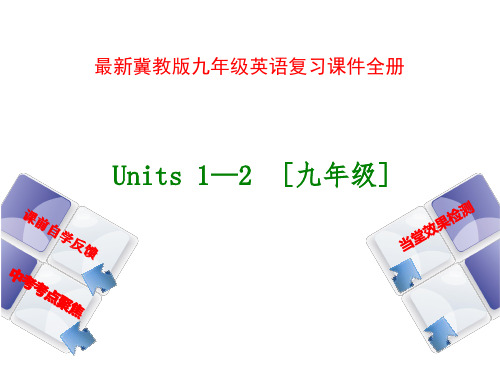
7.如果你的家庭成员吸烟,鼓励他们停止吸烟。
句 型 再 现
If your family members smoke, e_n_c_o_u_r_a_g_e them _____t_o__s_t_o_p__s_m_o_k_i_n_g_____. 8.我觉得我们应该努力养成好习惯来使我们保持健康,远离 医院! I think we should try hard to form good habits
第13课时 Units 1—2 [九年级]
【典型例题】
—Did you talk back to your mother when you were a child?
—Yes. But now I realize I was wrong. I really regret ___C_____ that silly thing to my mum.
第13课时 Units 1—2 [九年级]
中考考点聚焦
A. 词汇点睛
●1 regret v.& n. 惋惜;懊悔;遗憾 【点拨】 (1)regret to do sth.表示对即将要做的事情感到 “遗憾或抱歉”。 regret doing sth表示对已发生的事情感到“懊悔或后悔”。 I regret to have to do this, but I have no choice. 我很遗憾必须这样去做,但是我别无选择。 She regretted having missed the film. 她懊悔没能看上那场电影。 (2)regret作名词, 为不可数名词。 She expressed her regret at/over the decision. 她对这个决定表示失望。
10.集中于__f_o_c_u_s__o_n___
冀教版九年级英语全册知识点总结
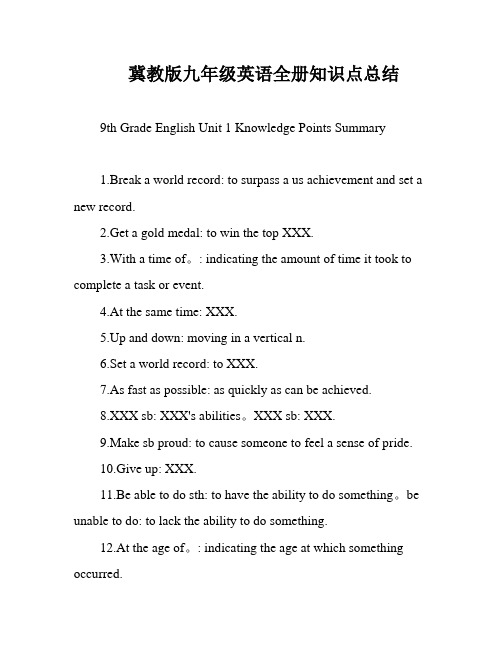
冀教版九年级英语全册知识点总结9th Grade English Unit 1 Knowledge Points Summary1.Break a world record: to surpass a us achievement and set a new record.2.Get a gold medal: to win the top XXX.3.With a time of。
: indicating the amount of time it took to complete a task or event.4.At the same time: XXX.5.Up and down: moving in a vertical n.6.Set a world record: to XXX.7.As fast as possible: as quickly as can be achieved.8.XXX sb: XXX's abilities。
XXX sb: XXX.9.Make sb proud: to cause someone to feel a sense of pride.10.Give up: XXX.11.Be able to do sth: to have the ability to do something。
be unable to do: to lack the ability to do something.12.At the age of。
: indicating the age at which something occurred.13.Catch up with: to reach the same level as someone or something else.14.None of: indicating the absence of any of something.15.Fall off: to drop or separate from a surface or object.16.Do one's best: to put XXX.17.XXX: XXX.9th Grade English Unit 2 Knowledge Points Summary1.XXX: XXX.2.Hold a world record: to maintain a current record.3.XXX。
冀教版英语九年级全册知识点
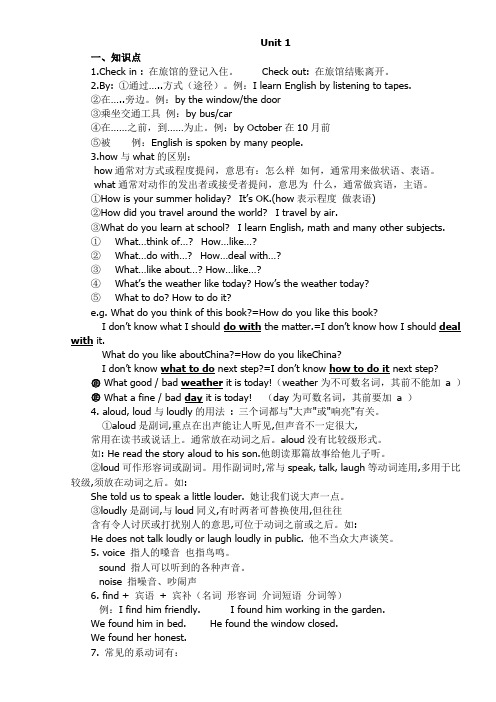
Unit 1一、知识点1.Check in : 在旅馆的登记入住。
Check out: 在旅馆结账离开。
2.By: ①通过…..方式(途径)。
例:I learn English by listening to tapes.②在…..旁边。
例:by the window/the door③乘坐交通工具例:by bus/car④在……之前,到……为止。
例:by October在10月前⑤被例:English is spoken by many people.3.how与what的区别:how通常对方式或程度提问,意思有:怎么样如何,通常用来做状语、表语。
what通常对动作的发出者或接受者提问,意思为什么,通常做宾语,主语。
①How is your summer holiday? It‟s OK.(how表示程度做表语)②How did you travel around the world? I travel by air.③What do you learn at school? I learn English, math and many other subjects.①What…think of…?How…like…?②What…do with…?How…deal with…?③What…like about…? How…like…?④What‟s the weather like today? How‟s the weather today?⑤What to do? How to do it?e.g. What do you think of this book?=How do you like this book?I don‟t know what I should do with the matter.=I don‟t know how I should deal with it.What do you like aboutChina?=How do you likeChina?I don‟t know what to do next step?=I don‟t know how to do it next step?㊣ What good / bad weather it is today!(weather为不可数名词,其前不能加 a )㊣ What a fine / bad day it is today! (day为可数名词,其前要加 a )4. aloud, loud与loudly的用法: 三个词都与"大声"或"响亮"有关。
冀教版九年级英语上册知识点归纳

九年级英语第一单元知识点归纳1.break a world record 打破世界记录2.get a gold medal 获得金牌3.with a time of … 用…时间4.at the same time 同时5.up and down 上上下下6.set a world record创造世界记录7.as fast as possible 尽快8.believe in sb 信任某人believe sb 相信某人的话9. make sb proud使某人感到自豪10. give up 放弃11.be able to do sth能够做某事be unable to do 不能做某事12. at the age of … 在…岁的时候13.catch up with 赶上14. none of 一个也没有15.fall off 掉下16.do one’s best 尽某人的努力17.the others 别的九年级英语第二单元知识点归纳1.take turns 轮流, 交替2.hold a world record 保持世界记录3.be located in / on …位于4.be proud of 以…自豪5.on average 通常6.on record 记载下来有7.four times as --- as --- 是…四倍8.think of 想出9.find out 了解, 找出10.some more 更多一些11.try to do sth 试着去做某事12.all over the world 遍及全世界13.be full of 装满14.it’s + adj.+ for s b to do sth 对某人干某事怎么样15.it’s time for sb to do sth 某人该干某事了16.such as 例如17.take part in 参与18.that’s very kind of sb to do sth某人做事太好九年级英语第三单元知识点归纳1.pay …for… 付钱, 赔偿2.make money 挣钱3.something to eat 吃的东西4. what’s the price of … 价钱是…5. get up 起床6.be hard to do sth 做某事难e up to 到达8.go over to 走过9.give sth back to sb 把… 还给某人10.do / deal with 处理11.elementary school 小学12.hold up 挂起13.on the Internet 在互联网上14.what else别的什么15.hear of 听说16.set up 创建17.have success in 在…取得成功business hours 营业时间18.any other 别的九年级英语第四单元知识点归纳1. wake up 醒来2. what’s wrong with …怎么了3. get a cold 感冒4. get dressed穿衣5. be weak in 在… 薄弱6. point to 指向…7. look up 查字典8. out of breath 上气不接下气9. miss school 没去上学10. take medicine吃药11. breathe through the nose通过鼻子呼吸12. must be 一定表示推测否定:can’t be13. stay healthy 保持健康14. be different from 不同于…15. be made from /of由…制成16. be bad for对..有害17. get a pain in …在…哪痛18. dare to do sth 敢于做某事19. think about 考虑20. get married结婚21. fall ill 生病22. as soon as 一…就23. the more, the better 越多越好九年级英语第五单元知识点归纳1. be famous/ well-known for 以…而著名2. learn sth from 从… 学到东西3. be born in+地点/ on +时间:出生于…4. not(才) … until ….直到…才…5. make a mistake 犯错by mistakes 错误地By accident 意外地6. so/such… that …如此…以至7. so that 为了,以便=in order that 从句8. come up with 想出, 提出=think of9. in the 1960s 在二十世纪六十年代10. devote to do sth 致力于干../ devote oneself to (介词)11. because of 因为+词或短语。
冀教版英语九年级_Lesson4—Lesson6_教材知识详解

Lesson4—Lesson6教材知识详解1. If so, what do you advise them to do? 如果有,你建议他们做什么?advise sb. (not)to do sth.建议某人(不)做某事。
advise为动词,意为“建议,劝告,忠告”,其名词形式为advice。
如:My sister advised me to wear that pink coat.我姐姐建议我穿那件粉色的外套。
常见的接动词不定式作宾语补足语的结构还有:ask sb. (not) to do sth.请求某人(不)做某事,tell sb. (not) to do sth.告诉某人(不)做某事,warn sb. (not) to do sth.警告某人(不)做某事。
2. Smoking is bad for your health. 吸烟对你的健康有害。
be bad for sth./sb.有害于某物或某人,其反义词组为be good for;意为“对……有好处”,同义词组为be harmful to sb.意为“对某人有害处”。
如:Smoking is harmful to your health.抽烟对你的健康有害处。
3. Every year, millions of people around the world die as a result of smoking.每年,全世界有上百万的人因吸烟而死亡。
①millions of意为“上百万的”。
当用hundred,thousand,million,billion 等词表示一个不具体的数字时,这些词用复数形式,而且常与介词of连用修饰名词。
hundred, thousand, million, billion等词前有具体教字时,其本身用单数形式,直接修饰名词。
如:During the National Day, millions of travellers came to the Summer Palace.国庆节期间,数百万的游客来到颐和园。
- 1、下载文档前请自行甄别文档内容的完整性,平台不提供额外的编辑、内容补充、找答案等附加服务。
- 2、"仅部分预览"的文档,不可在线预览部分如存在完整性等问题,可反馈申请退款(可完整预览的文档不适用该条件!)。
- 3、如文档侵犯您的权益,请联系客服反馈,我们会尽快为您处理(人工客服工作时间:9:00-18:30)。
Unit 1一、知识点1、Check in : 在旅馆得登记入住。
Check out: 在旅馆结账离开。
2、By: ①通过…、、方式(途径)。
例:I learn English by listening to tapes、②在…、、旁边。
例:by the window/the door③乘坐交通工具例:by bus/car④在……之前,到……为止。
例:by October在10月前⑤被例:English is spoken by many people、3、how与what得区别:how通常对方式或程度提问,意思有:怎么样如何,通常用来做状语、表语。
what通常对动作得发出者或接受者提问,意思为什么,通常做宾语,主语。
①How is your summer holiday? It’s OK、(how表示程度做表语)②How did you travel around the world? I travel by air、③What do you learn at school? I learn English, math and many other subjects、① What…think of…? How…like…?② What…do with…? How…deal with…?③ What…like about…? How…like…?④ What’s the weather like today? How’s the weather today?⑤ What to do? How to do it?e、g、 What do you think of this book?=How do you like this book?I don’t know what I should do with the matter、=I don’t know how I should deal with it、What do you like aboutChina?=How do you likeChina?I don’t know what to do next step?=I don’t know how to do it next step?㊣What good / bad weather it is today!(weather为不可数名词,其前不能加a )㊣What a fine / bad day it is today! (day为可数名词,其前要加a )4、 aloud, loud与loudly得用法 : 三个词都与"大声"或"响亮"有关。
①aloud就是副词,重点在出声能让人听见,但声音不一定很大,常用在读书或说话上。
通常放在动词之后。
aloud没有比较级形式。
如: He read the story aloud to his son、她朗读那篇故事给她儿子听。
②loud可作形容词或副词。
用作副词时,常与speak, talk, laugh等动词连用,多用于比较级,须放在动词之后。
如:She told us to speak a little louder、她让我们说大声一点。
③loudly就是副词,与loud同义,有时两者可替换使用,但往往含有令人讨厌或打扰别人得意思,可位于动词之前或之后。
如:He does not talk loudly or laugh loudly in public、她不当众大声谈笑。
5、 voice 指人得嗓音也指鸟鸣。
sound 指人可以听到得各种声音。
noise 指噪音、吵闹声6、 find + 宾语 + 宾补(名词形容词介词短语分词等)例:I find him friendly、 I found him working in the garden、We found him in bed、 He found the window closed、We found her honest、7、常见得系动词有:①就是:am 、is、 are②保持:keep、 stay③转变:bee、 get、 turn④……起来 feel、 look、 smell、 taste、 sound8、 get + 宾语+宾补(形容词过去分词动词不定式) 使某种情况发生例:Get the shoes clean、把鞋擦干净Get Mr、 Green to e、让格林先生进来I want to get my bike repaired、我想去修自行车You can’t get him waiting、您不能让她老等着9、动词不定式做定语①与所修饰得名词构成主谓关系The next train to arrive was fromNew York、 He is always the first to e、②与所修饰得名词构成动宾关系I have nothing to say、 I need a pen to write with、I need some paper to write on、 I don’t have a room to live in、10、 practice , fun 做名词为不可数名词11、 add 补充说又说12、 join 加入某团体并成为其中一员 attend 出席参加会议或讲座join in与take part in指参加到某项活动中去。
13、all、 both、 always以及every复合词与not连用构成部分否定。
其完全否定为:all---none, both---neither, everything---nothing, everybody---nobody、14、 be afraid of doing sth、 / sth、害怕 be afraid of being alonebe afraid to do sth、害怕be afraid that恐怕担心,表示委婉语气15、either:①放在否定句末表示“也”②两者中得“任一”③either…or…或者…或者、…引导主语部分,谓语动词按照就近原则16、plete完成,就是个较正式得词,后不能接动名词finish指日常事物得完成17、a,an 与序数词连用表示“又一”,“再一”。
例:Please give me a second apple、 There es a fifth girl、18、have trouble/difficult/problem (in) doing…、、干…、、遇到麻烦,困难19、unless 除非,如果不,等于“if not”本身就表示否定,引导条件状语从句,主句为将来时,条件状语从句用一般现在时表示将来。
例:My baby sister doesn’t cry unless she’s hungry、=My baby sister doesn’t cry if she isn’t hungry、Unless you take more care, you’ll have an accident、如果您不多加小心得话,您会出事得。
20、instead: adv、代替,更换。
例:We have no coffee, would you like tea instead?我们没有咖啡了,改喝茶好吗?It will take days by car, so let’s fly instead、开车去要好几天呢,咱们还就是坐飞机吧。
Tom was ill, so I went instead、汤姆病了,所以换了我去。
instead of doing sth、作为某人或某事物得替换例:Let’s play cards instead of watching TV、We sometimes eat rice instead of potatoes、Give me the red one instead of the green one、21、spoken 口头得,口语得。
spoken English 口头英语speaking 讲话得,说某种语言得。
Speaking skills讲英语得能力22、提建议得句子:①What/ how about +doing sth、? 如:What/ How about going shopping?②Why don’t you + do sth、? 如:Why don’t you go shopping?③Why not + do sth、 ? 如:Why not go shopping?④Let’s + do sth、如: Let’s go shopping⑤Shall we/ I + do sth、? 如:Shall we/ I go shopping?23、 a lot 许多常用于句末如:I eat a lot、我吃了许多。
24、 too…to 太…而不能常用得句型 too+adj、/adv、 + to do sth、如:I’m too tired to say anything、我太累了,什么都不想说。
25、 not …at all 一点也不根本不如:I like milk very much、 I don’t like coffee at all、我非常喜欢牛奶。
我一点也不喜欢咖啡。
not经常可以与助动词结合在一起,at all 则放在句尾26、be / get excited about sth、=== be / get excited about doing sth、=== be excited to do sth、对…感兴奋如:I am / get excited about going toBeijing、===I am excited to go toBeijing、我对去北京感到兴奋。
27、① end up doing sth 终止做某事,结束做某事如:The party ended up singing、晚会以唱歌而结束。
② end up with sth、以…结束如:The party ended up with her singing、晚会以她得歌唱而告终。
28、 first of all 首先、 to begin with 一开始later on 后来、随29、 also 也、而且(用于肯定句)常在句子得中间either 也(用于否定句)常在句末too 也 (用于肯定句) 常在句末=as well30、 make mistakes 犯错mistake sb、 for …把……错认为……make mistakes (in) doing sth、在干某事方面出错by mistake 错误地;由于搞错mistake---mistook----mistaken如:I often make mistakes、我经常犯错。
